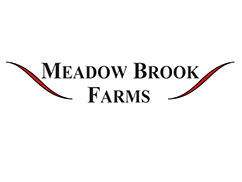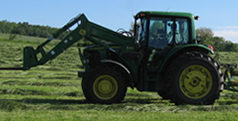“To be interested in food and not food production is clearly absurd.” -Wendell Berry
I believe the same can be said of whiskey and grain production.
I had an opportunity to meet with Nevada Mease, a young, entrepreneurial Lehigh Valley farmer back in September, 2016. I was incredibly impressed with the farm and all the efforts on behalf of Meadow Brook Farms to embrace new, organic practices in their farming. The farm itself is beautiful and nestled into wooded acreage along the outskirts of the property. It’s built into the side of a hill with the barn and storage facilities higher up above the stone farm house. Animals were grazing in the fields, and Nevada was making plans to get his winter crops laid down in the fields.
Meadow Brook Farm is one of the farms that I was very excited to meet with because of their relationship with both a local distillery and a local mill-both in Bucks County, Pennsylvania. Nevada Mease plants winter rye that is distilled into rye whiskey and red corn that is distilled into bourbon. The heirloom varietals of red corn (Bloody Butcher) are non-GMO and don’t produce nearly as high a yield as genetically modified seeds, but the distilleries want the good stuff and are willing to pay for it. Nevada took me on a tour of the property to show me just what he was doing for the soil to promote healthy growth from his crops.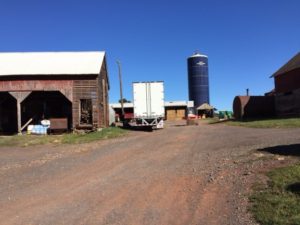
One of the fields down the road was being set up for red corn in the spring. Each year, farmers lay down cover crops to maintain soil integrity over the winter months. Rye is often planted in the autumn as a cover crop by farmers because of its ability to restore nitrogen to the soil that the corn drew out. Before the cold weather and frost sets in, rye’s roots grow down quickly, anchoring loose soil and decreasing top soil loss due to run off and snow melt. Cover crops are not meant to harvested, but are used as a conservation measure. Nevada is going a step further with his cover crops because he wants to restore not just nitrogen, but the overall health of the soil. To prep his non-GMO corn field, he has planted peas (to fix nitrogen), radishes (to aerate the soil, loosen dirt, hold nitrogen, and eventually rot to encourage earth worm action) and clover (to out-compete other spring annuals). This cover crop will not be plowed under like most cover crops, but, instead, plant corn directly into the same field in the spring. The heirloom corn, most likely the red, bloody butcher corn, will thrive in this enriched top soil.

These practices are not very common, but are gaining interest based on their successes in places like Ohio, New York, and S.Dakota. It is an amazing thing to see organic practices being brought back to Pennsylvania. Farmers are slow to adopt such practices because change does not come easily to agriculture. First, success must be proven many times. Farming practices must prove cost effective. No one will risk their farm if they stand to lose money. Next, the crop must be desirable to a buyer. You can grow all the heirloom open-pollinated corn or heritage grain you like, but if no one buys it, there is no point. As a farmer, you pay for your time and your worker’s time, spray and pesticides, fertilizer (organic or non-organic), seeds, equipment (combines, tractors, balers, planters/seeders, tillers, etc., whether you rent them or own), seed drying, seed cleaning/de-hulling, storage and much more.

When you consider that corn is priced (it varies) at about $3.50 a bushel, that is a lot of time, work and expense for not a lot of profit. When organic farming practices add additional costs to farmers, they will always stick with what pays the bills. Farms like Meadow Brook are diversifying to insure their success in a changing economy.
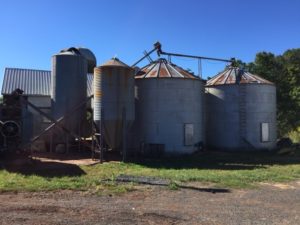
Nevada Mease is a young man in his thirties with a degree in engineering from Lock Haven University and business degree from DeSales. He is from a well-known family in Lehigh County with 200 years of farming history and has used his business education to move his family and his farm into modern agricultural times. Meadow Brook’s main crop is hay.
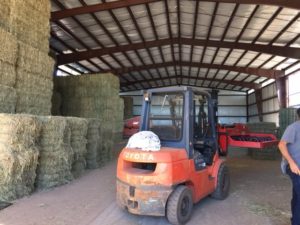
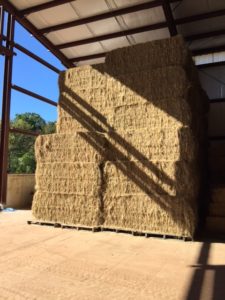 In 2003, they began to buy hay from locations in Michigan, Ohio, Colorado, Montana, Canada and New York. Nevada’s tractor trailer hauls hay back to Pennsylvania and he loads and unloads that hay with modern machinery. The work of four men that would take all afternoon now takes one man a few hours. He stores that hay on his farm in a huge, insulated steel storage facility where customers can see for themselves the quality of the products he sells. He grows hybrid rye grain to sell directly to distillers that mill their grain in-house. (That rye makes great whiskey, by the way.) He grows non-GMO corn varietals to sell to a local stone-ground mill that produces high quality grits and cornmeal for Philadelphia restaurateurs. That same corn is utilized by a distiller to make bourbon whiskey at a second distillery. He raises black Angus beef cattle that provide a sustainable balance for his farm’s operations. It is a beautiful thing to see this farm succeed and thrive. I consider myself lucky every time I drive by on my way to my mother’s dairy. I know that the Mease family will be successfully farming in Lehigh County for many years to come.
In 2003, they began to buy hay from locations in Michigan, Ohio, Colorado, Montana, Canada and New York. Nevada’s tractor trailer hauls hay back to Pennsylvania and he loads and unloads that hay with modern machinery. The work of four men that would take all afternoon now takes one man a few hours. He stores that hay on his farm in a huge, insulated steel storage facility where customers can see for themselves the quality of the products he sells. He grows hybrid rye grain to sell directly to distillers that mill their grain in-house. (That rye makes great whiskey, by the way.) He grows non-GMO corn varietals to sell to a local stone-ground mill that produces high quality grits and cornmeal for Philadelphia restaurateurs. That same corn is utilized by a distiller to make bourbon whiskey at a second distillery. He raises black Angus beef cattle that provide a sustainable balance for his farm’s operations. It is a beautiful thing to see this farm succeed and thrive. I consider myself lucky every time I drive by on my way to my mother’s dairy. I know that the Mease family will be successfully farming in Lehigh County for many years to come.